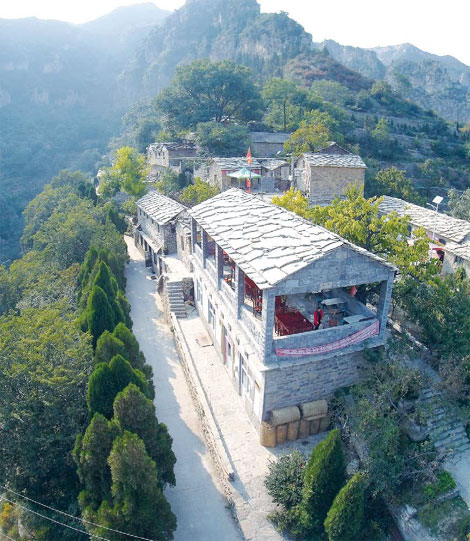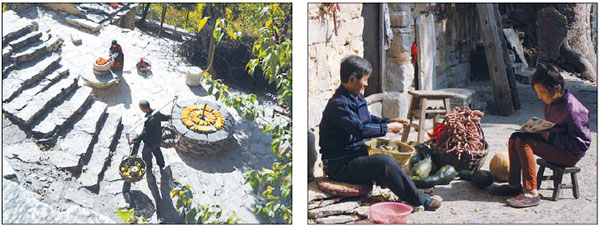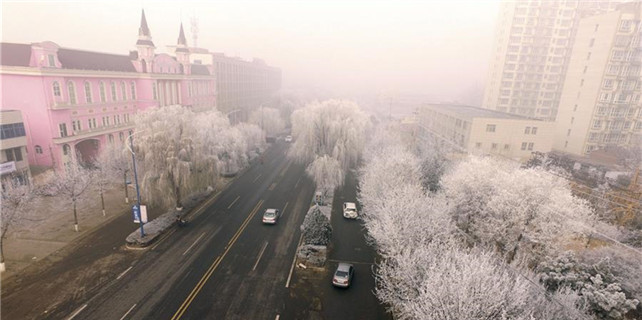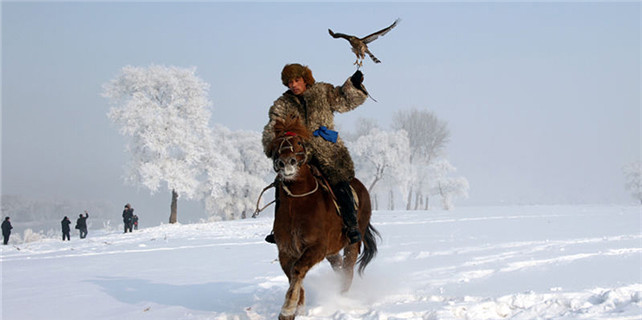Unveiling a hidden gem
To avoid persecution, the family of a Song Dynasty general took refuge on a mountain - and the village they created can now be enjoyed by tourists
Thirty-three families have lived in relative seclusion in Yuejiazhai village in northern China for hundreds of years.
"We're descendants of Yue Lin, the third son of Yue Fei. I'm a 35th generation descendant," says Yue Xianlai, the village Party chief.

|
|
Yue Fei was a general who led the Southern Song Dynasty (1127-1279) forces against the Jin Dynasty (1115-1234) from northeastern China. He was put to death along with his eldest son, Yue Yun, in 1142 by the Song ruler after being accused of plotting a rebellion. However, 27 years later, he was being portrayed as a national hero for his loyalty.
Yue Fei's death was a turning point for his wife and other four sons, however. Fearing further persecution, they fled.
The villagers say Yue Lin took 33 families with him, mostly relatives, servants and guards.
During their journey, they camped under a big tree in the remote Thaihang mountains in what is now Pingshun, Shanxi province. That night, Yue Lin had a dream, in which the tree told him to settle under it and promised to protect his people.
The next morning, he decided to follow the instruction and the group began to build stone houses there. They also created terraced fields on the mountain slope and began to cultivate crops. Not far from the tree was a spring, the only water source.
The tree and the spring are still there today. The tree is worshipped as the guardian angel of the village, and the spring is still a vital resource. Most of the stone houses are hundreds of years old.
"Life is quiet and natural here," says Zhang Haigen, the village head, who is in his late 30s.
The number of families has not changed much over 800 years; plus, they still eat what they plant and hunt, they wear what they make and find, and they speak Chinese in a dialect that can be traced to the Song Dynasty. The only thing they source from outside is salt.
"To outsiders, we look like savages," says Zhang, who left the village for the first time at the age of 16, using a road only completed in the late 1990s. "I suppose the outside world fears us as much as we fear it.
"We're very disciplined and literate 'savages'. We're familiar with all of Yue Fei's legends. They teach us to be responsible and loyal to family, beliefs and our motherland."
For more than 800 years, the village has operated its own school, clinic, temple and committees. It had family law and village law, originating from the Yue family during the Song.
The local government started building a 20-kilometer mountain path connecting the village to the closest town in 1996, and the road, which includes a 50-meter tunnel, was completed several years later.
"It took about a day to walk to the town before the road was completed. This was because there was a cliff on the way, so if we wanted to go to the town we had to go past the cliff," Yue Xianlai says. His father died when he fell off the cliff during one such journey.

Speaking of the original plan to settle in the remote area, Zhang says, "Yue Lin made the right decision, as the village is like an island protected by formidable mountains."
Even the Mongolians, Manchurians, and Japanese - the three main invaders and occupiers in northern China after the 12th century - did not manage to get to the village.
If their ancestors had learned about Yue Fei's rehabilitation 27 years after they settled there and left the area, many families would have become victims of the later wars, the villagers say.
"Before the road was built, we just did not want to go outside the village, fearing that people outside would bully us," says Zhang Jianlu, the 76-year-old father of Zhang Haigen.
His son adds: "We started learning about what had happened over the past 800 years only in the late 1990s. But our earlier education gave us a good foundation to adapt to modern life."
When the first visitors came to the village about 15 years ago, they were interested in learning about the village, and vice versa.
"The villagers did not even understand the concept of buying and selling at that time," says Zhang Haigen.
But together with the road came electricity and travelers. Now, most young people go to work in cities, leaving only the elderly in the village.
Contact the writers through liyang@chinadaily.com.cn























